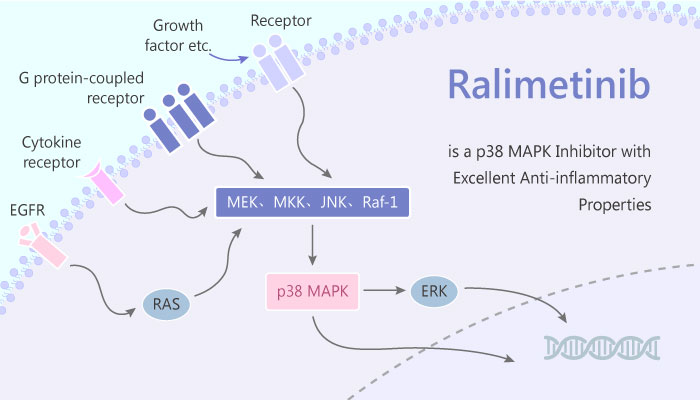In the blog “Network of Cancer Research”, we have introduced Ralimetinib with anti-tumor activity. In fact, the scientists identified Ralimetinib that has excellent anti-inflammatory properties, firstly.
Firstly, let’s review the introduction before.

In general, Ralimetinib is a potent and selective, ATP-competitive and oral active inhibitor of p38 MAPK α/β, with IC50 values of 5.3 and 3.2 nM, respectively. Ralimetinib selectively inhibits phosphorylation of MK2 (Thr334), with no effect on phosphorylation of p38a MAPK, JNK, ERK1/2, c-Jun, ATF2, or c-Myc.
The researchers used LPS-treated mice to study the anti-inflammatory of Ralimetinib.
As a result, in LPS-induced mice, Ralimetinib effectively inhibits the formation of TNFα with a threshold minimum 50% effective dose (TMED50) less than 1 mg/kg. Additionally, in a rat model of collagen-inducedarthritis (CIA), Ralimetinib dimesylate displays potent effects on paw swelling, bone erosion, and cartilage destruction, with a threshold minimum 50% effective dose (TMED50)of 1.5 mg/kg.
Furthermore, Ralimetinib has come into the clinical trials, and it is the first oral p38 MAPK inhibitor in-human phase I study. And as a result, Ralimetinib demonstrated acceptable safety, tolerability, and pharmacokinetics for patients with advanced cancer. However, there has been no clinical trial of Ralimetinib about the effect on inflammatory diseases.
To sum up, Ralimetinib (LY2228820) has both anti-inflammatory and anti-tumor activity.
Reference:
Mader M, et al. Imidazolyl benzimidazoles and imidazo[4,5-b]pyridines as potent p38alpha MAP kinase inhibitors with excellent in vivo antiinflammatory properties. Bioorg Med Chem Lett. 2008 Jan 1;18(1):179-83.
Patnaik A, et al. A First-in-Human Phase I Study of the Oral p38 MAPK Inhibitor, Ralimetinib (LY2228820 Dimesylate), in Patients with Advanced Cancer. Clin Cancer Res. 2016 Mar 1;22(5):1095-102.